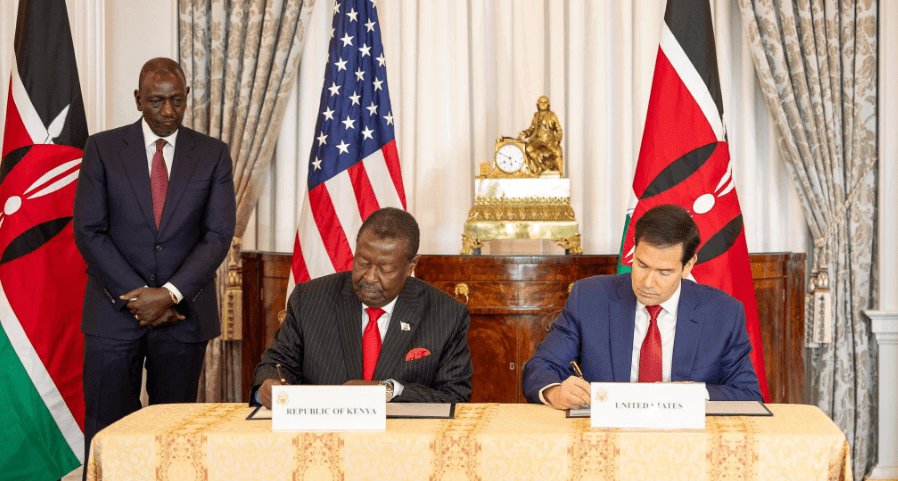![[PHOTOS] Families, survivors mark 27th anniversary of 1998 bombing](/_next/image?url=https%3A%2F%2Fcdn.radioafrica.digital%2Fimage%2F2025%2F08%2F75d69667-ae55-4f29-9c96-6b2ae41dc965.jpg&w=3840&q=100)

Every crisis has a turning point to leverage to create
better resilience and response mechanisms to handle future similar challenges
or other threats.
The terror attack on
the US embassy in Nairobi on August 7, 1998 presented Kenya with an opportunity
to elevate terrorism threat to existential levels to better deal with it.
The sheer loss of innocent lives and massive destruction of
properties through the bomb blast masterminded by Osama bin Laden, the then
Al-Qaeda terror group leader, jolted Kenya to upgrade its counter terrorism
strategies.
Despite the 7th August bomb blast being one of Kenya’s first
major terrorist attacks, its handling of the incident and the resultant
investigations in collaboration with international partners was impressive.
From the onset, the Kenyan government and its American
counterpart vowed that the perpetrators of the terror attack would face the
full force of the law to not only serve justice to victims and survivors but
also act as a deterrent.
And true to their word, Kenya’s security agencies worked
with the Federal Bureau of Investigation (FBI) to arrest and extradite over 20
Al-Qaeda terrorists to face terrorism charges relating to the Nairobi bombing.
Among the terrorists paying dearly for the heinous act
through life sentences in American jails are Mohammed Sadeek Odeh, Mohammed
Rashed Daoud al-Owhali, Mamdouh Mahmud Salim and Wadih el-Hage.
Others like Osama Bin Laden and his ally Muhammad Atef were
killed, leaving Al-Qaeda a shell of its former self.
Osama’s then East African sidekick Fazul Abdullah Mohammed
suffered the same fate in Somalia in 2011 following a collaboration between
Kenyan and Somalia security agencies.
Since 1998, Kenya has invested heavily in both hard and soft
power to deal with the terrorism threat.
As a regional
security superpower and an anchor state in the global war against terrorism,
Kenya is obligated to be on top of the game in domestic counterterrorism and
international collaboration.
For instance, Kenya’s
military intervention in war-torn Somalia in 2011 to deal with Al-Shabaab
head-on continues to receive global accolades, as most states were cagey to
tackle the militants then.
For its efforts, the Kenya Defence Forces (KDF) would be
incorporated into subsequent peace missions, including the current African Union
Support and Stabilisation Mission in Somalia (AUSSOM), where it is a dependable
partner.
By taking the war to the enemy, Kenya managed to degrade
Al-Shabaab, which pledges allegiance to Al-Qaeda for relevance.
Over the years, the
government has done more than fighting and neutralising terrorists. There have
been concerted efforts to reform and empower the criminal justice system to
prosecute those caught in the act of terrorist activities.
Kenya now boasts of a robust criminal justice system that
has embraced good practices to respond to terrorism-related crimes, including
aspects of international cooperation to fight terror.
The work of the criminal justice actors is made easy by
progressive pieces of legislation like the Prevention of Terrorism Act, 2012,
which spells out harsh penalties for the convicted terrorists.
Although security agencies, through intelligence-led
operations, have managed to disrupt numerous terrorist attacks, the few attacks
witnessed have been investigated, and the perpetrators have been held to account through
legal means.
The key criminal justice actorsare clearly working together
in the whole-of-government approach to secure convictions of terrorists and
dismiss appeals challenging their sentences.
As if to take a cue from what befell terrorists behind the
1998 bombing, most terrorists responsible for terror attacks in the country
have been jailed.
For instance, in 2020,
a Nairobi court found Mohammed Ahmed Abdi and Hussein Hassan Mustafa guilty of
helping Al-Shabaab militants to carry out a terror attack at the Westgate
Shopping Mall in 2013.
The criminal duo were charged with planning and committing
acts of terror, as well as supporting and helping a terrorist group. Mohammed
received a 33-year prison sentence and Hussein Hassan Mustafa was jailed for 18
years.
A similar fate befell two Kenyans and a Tanzanian who were
found guilty of abetting Al-Shabab terrorists who carried out the Garissa
University attack in 2015.
The Kenyans - Mohamed Ali Abikar and Hassan Aden Hassan were
handed a 41-year jail term, while the Tanzanian - Rashid Charles Mberesero
received a life sentence for being members of Al-Shabaab terrorist group and
being involved in a conspiracy to commit a terrorist act.
It was the same case for the facilitators of the Dusit D2 terror
attack in 2019, as the court recently jailed them for terrorism-related charges.
In the landmark conviction at the Kahawa Anti-Terror Court,
Mohamed Abdi Ali – a madrassa teacher and Hussein Mohamed Abdille Ali were
imprisoned for 30 years for facilitating a terrorist attack and conspiracy to
commit an offence contract to POTA Act.
The government seems determined to push for maximum
sentences for the terror convicts to reflect the severity of their crimes and
act as deterrence against future acts of terrorism.
The precedent-setting terrorism-related cases are not by
accident but a product of rejuvenated criminal justice system actors working in
synergy to protect national security interests.
The courts are increasingly considering circumstantial
evidence and progressively interpreting POTA to jail more terrorists.
On the other hand,
security agencies continues to receive accolades for high rate of converting
intelligence gathered into evidential material required to convict terrorists.
The government is also using other legal actions such as
watch-listing, deportations, declaration of prohibited immigrants, revocation
of remission and listing of specified entities to counter terrorism.
There is a need for specially-trained judges and magistrates
to effectively handle terrorism-related cases on a priority basis as part of
judiciary contribution to the war on terrorism.
The war against terrorism is too important to be left to
security agencies alone. It requires all stakeholders to collaborate and work
on joint strategies to deal with the ever-evolving terrorism threat in order to
make Kenya safe.
Omare is a security expert based in Nairobi

















